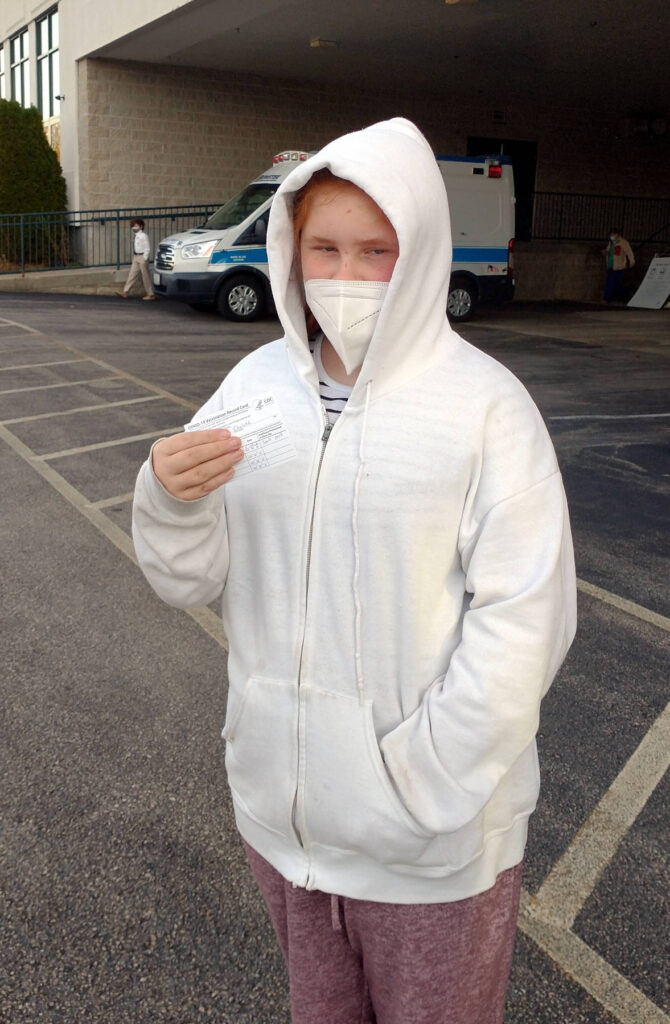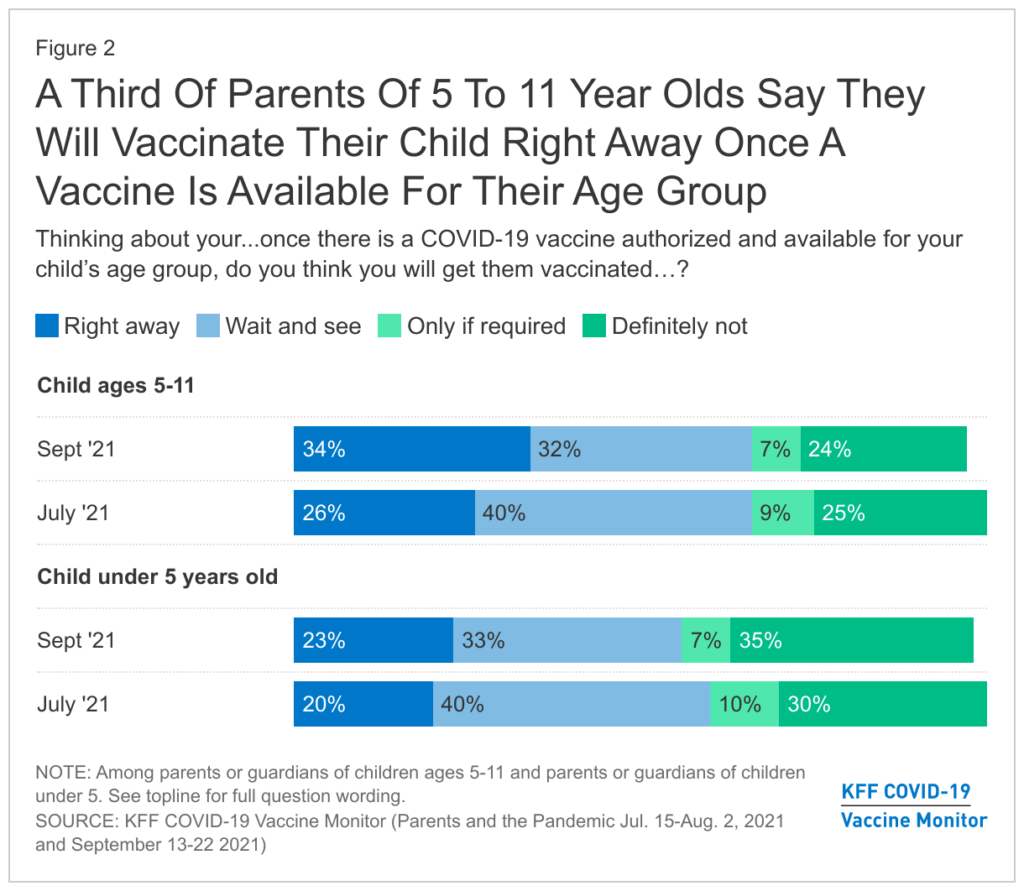
Maureen O’Gorman was so eager to schedule a COVID-19 vaccination for her 10 year-old daughter Charlotte that she began refreshing her web browser repeatedly 15 minutes before appointments opened yesterday at 2:00pm. They were able to obtain a 7:30am slot this morning at the state-run Sockanosset facility when it opened, making Charlotte one of the first in RI to receive a dose of the Pfizer pediatric vaccine.
In addition to vaccination appointments at state-run facilities and independent pharmacies at vaccinateri.org there will be children-only clinics at schools with a continuously updated list at covid.ri.gov/5to11vaccine. Every school clinic is open to all children aged 5-11 regardless of which school they attend or where they live. Chain pharmacies (including CVS, Walgreens, Walmart, and Stop and Shop) offer scheduling through their own web sites. Family and pediatric medical offices are in many cases offering vaccinations with further information available by contacting the office directly. (See “RI Children Ages 5-11 Likely Start COVID-19 Vaccinations Nov 8”, by Michael Bilow, Oct 27.)
UPDATE: On November 5, the RI Department of Health (DoH) cautioned that it is important to register for vaccination in advance: “Vaccination sites plan the amount of vaccine to have on hand using registration information. People who arrive at vaccination clinics without appointments may not receive a vaccine if there is not enough supply at the clinic. Registering in advance is the best way to guarantee that a dose will be on site for your child.”
Charlotte herself has been eager to be vaccinated. When she received her flu shot a few weeks ago, she joked that she was “practicing” for her COVID-19 shot. “Everyone there, they were really comforting. ‘It’s not going to hurt. We’ve got your vaccine.’ Everyone was very nice. It was fun,” Charlotte said about her experience, but “I don’t feel any different.” The Band-Aid hurt more than the shot, she said.
Maureen said that the facility was well set up; she was surprised there were not more children in queue, but guessed that the early morning time might not be popular although hers was one of three or four family groups in that time slot. It worked out well for them, she said, because they could go on their way before school and work.
“They had a separate shot area. They had three stations set up to handle kids in a separate area with a separate waiting space. There were coloring pages during your wait period. They gave all the kids a fidget spinner. They asked which arm they wanted,” Maureen said. “There are three kids named ‘Charlotte’ getting their shot at Sockanosset today,” so the facility was careful to distinguish by surname and date of birth, she said.
Maureen works as an educational supervisor and as an adjunct college professor. “I decided to get Charlotte vaccinated because, with the holidays coming up, she’ll be mixing with people of all ages and I want to make sure that everybody involved is as safe as possible, for her health and the health of those around her. I also consider it very high priority because I work in a congregate care setting… that’s had several outbreaks, so she’s at high risk of exposure through me,” she said. “I want to keep her as safe as possible. At the beginning of this, she actually stayed with relatives, but now that’s not practical because of the spotty nature of the thing and she has to go to school in person.”
Nationally, non-profit organization focusing on health issues KFF reported parents of children aged 5-11 attitudes toward COVID-19 vaccination: 34% eager, 32% wait and see, 7% only if required, and 24% definitely not. KFF separately explained, “This means there initially will likely be high demand for vaccines, when scale up and distribution issues noted above may pose challenges. After this initial surge, however, the primary challenge is likely to shift to addressing concerns or questions that contribute to reluctance to vaccinating younger children.”

The RI Department of Health (DoH) recommends COVID-19 vaccination for everyone eligible. DoH said in a statement yesterday, “Children of all ages can become ill with COVID-19. Most children do not become as sick as adults. However, some children become severely ill with COVID-19. Children with underlying conditions, such as obesity, diabetes, and asthma, may be at higher risk of serious illness with COVID-19. Since the start of the pandemic, 194 children 14 and younger have been hospitalized in Rhode Island with COVID-19. Additionally, children can spread COVID-19 to the other people in their lives (who may be more vulnerable).”
A personal experience started Maureen thinking that an encounter with COVID-19 infection could “come back to haunt” Charlotte long into the future: before she was old enough to attend school herself, Maureen caught chicken pox from her older brother, a typical childhood case that was almost forgotten until decades later, in 2020, when she had an outbreak of shingles as an adult.
“I know that in most kids COVID-19 is not a big deal, and you could probably count on one hand the number of children my daughter’s age who have died of COVID-19, but nowadays post-polio syndrome is a thing and people who had chicken pox get shingles [later in life]. We don’t know what the COVID virus that lies in your body is going to look like in 30 or 40 years. So I’m kind of thinking long-term on this. I don’t consider her high-risk at this moment in time; of course she could get COVID and she is low risk for immediate danger now, however I don’t know what carrying COVID in her body for 30 or 40 years, what that would look like. So my middle-aged daughter will be thanking me someday.”
Maureen emphasized, “Charlotte will never get shingles because she got the chicken pox vaccine. Charlotte will never get post-polio because she will never get polio thanks to a vaccine. I do not know what post-COVID will look like in 2058, but Charlotte will never need to worry about it.” In other words, from a cost-benefit perspective the risks of not vaccinating are substantial and unknowable, while the risks of vaccinating are quantifiable and understood.
“I don’t have any anxiety about the vaccine. My understanding is the only serious side effect is the myocarditis [heart inflammation] that’s only been an issue with males, and insofar as I’m aware there are no cases of that not resolved successfully,” she said. “It’s easy for me to be brave and say I have no concerns about the vaccine, but I have a daughter so, right then and there, we’re talking about a myocarditis risk that goes from a very slim chance to effectively zero chance,” she said.
Disclosure: Maureen O’Gorman is an occasional contributor to Motif. She wrote about the first day of drive-through COVID-19 testing in RI (“Drive-Thru for COVID-19 Test: These efficient test sites will help RI reach the goal of testing 1,000 Rhode Islanders a day”, Apr 1, 2020).

